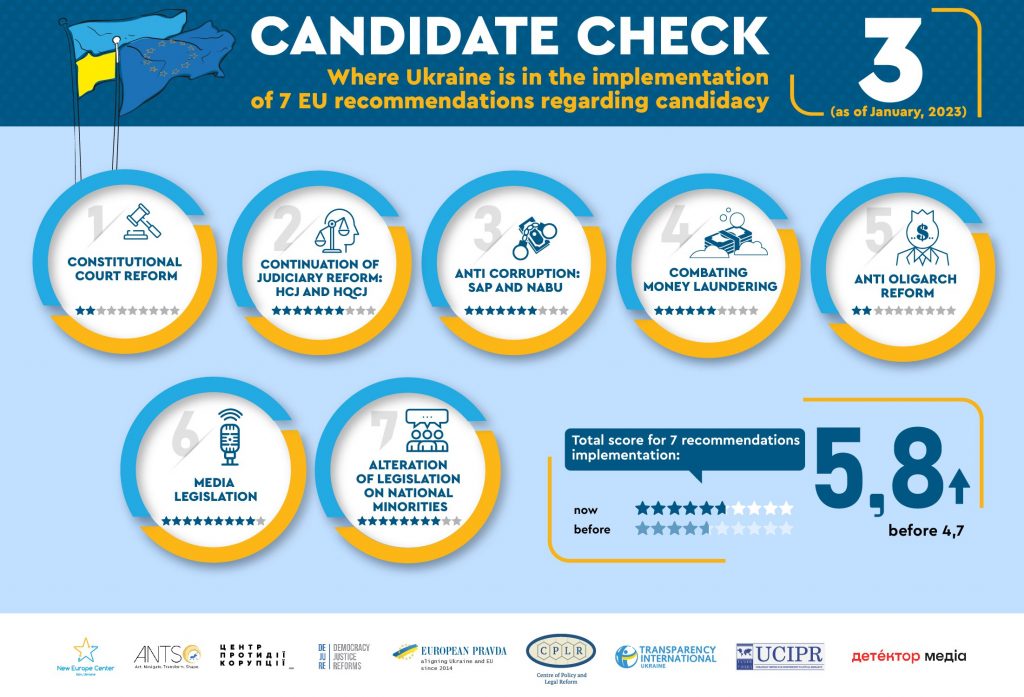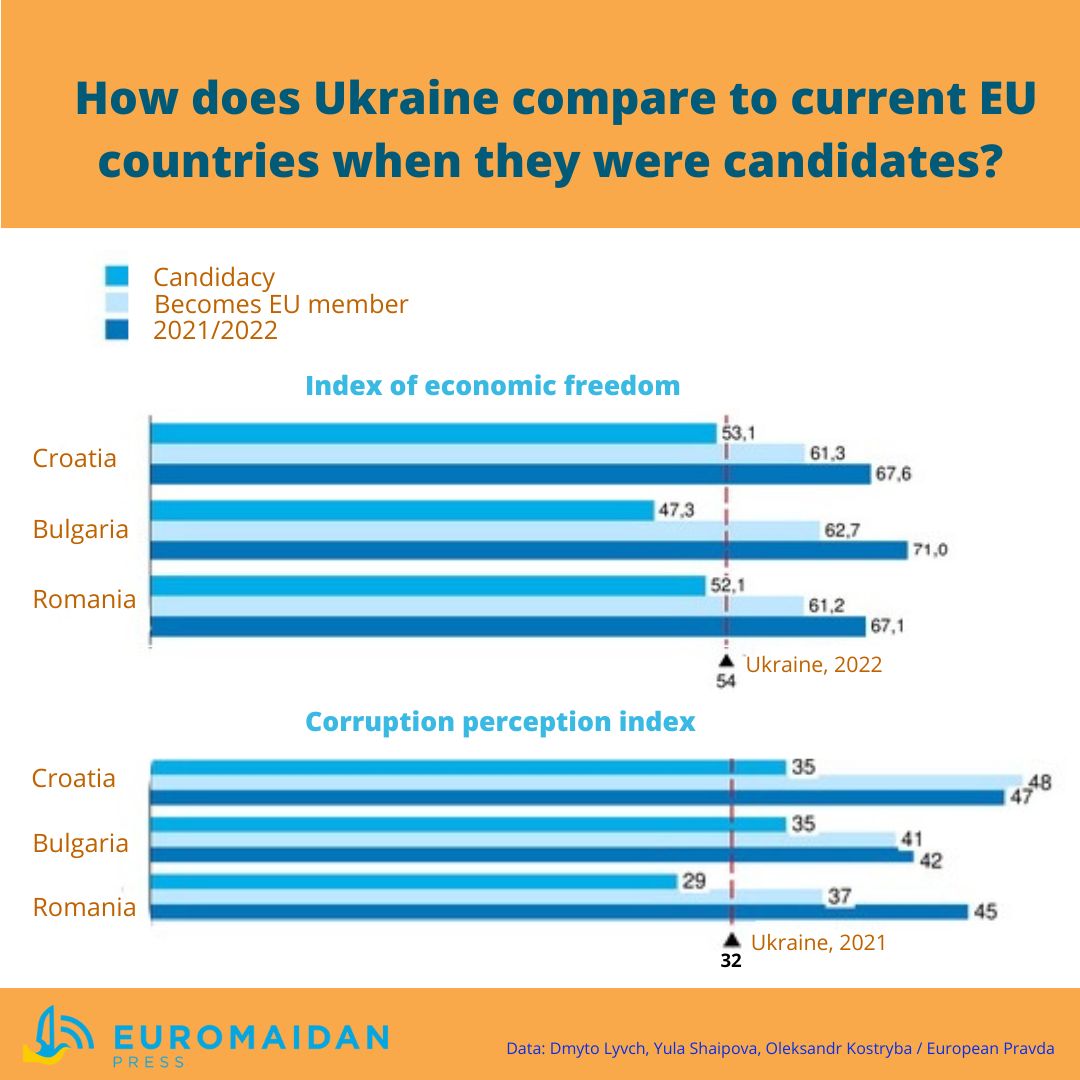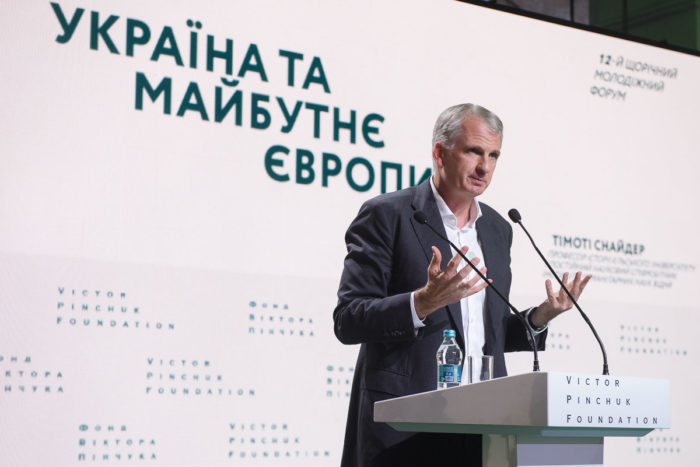On 3 February President of the European Council Charles Michel, President of the European Commission Ursula von der Leyen, President of the European met with Ukrainian President Volodymyr Zelenskyy in Kyiv for the EU-Ukraine summit to discuss the accession of Ukraine to the European Union, sanctions against Russia, and food crisis.
From liberating Crimea to path into the EU: results of EU-Ukraine 2023 wartime summit in Kyiv
Its main signal was that Ukraine will become an EU member. It is no longer a question of if, but a question of when.
However, another signal was that this will happen when Ukraine fulfils all the necessary criteria and leaves no homework unfinished.
What are the necessary criteria that Ukraine should fulfill and how close is it to achieving them?
How does a country become an EU member?
Ukraine applied for EU membership in February 2022 and was granted EU candidate status in June 2022.
Basically, a country can become an EU member when it fulfills the Copenhagen criteria. A country applying it membership should have:
- stable institutions that ensure democracy, rule of law, human rights and respect for minority rights;
- a functioning market economy that will be competitive in the EU market;
- the ability to assume the obligations of membership, including compliance with the objectives of political, economic and monetary union.
The accession process developed by the Europen Commission is divided into 35 chapters and six clusters, and for each chapter, conditions exist for opening and closing negotiations that determine the state of compliance with the criteria.
After a country is granted candidacy and during accession negotiations, the EU Commission regularly assesses the progress of candidate countries in each section and gives recommendations for achieving the Copenhagen criteria.
During the summit on 3 February, it was agreed that Ukraine would receive a progress report in the spring instead of the fall, as planned earlier. However, it already has seven recommendations provided to along with EU candidate status, aimed at facilitating Ukraine’s implementation of the Copenhagen criteria.
Ahead of the meeting, Prime Minister Denys Shmyhal, in an interview with Politico, said that Ukraine had set what he called an “ambitious goal” of joining the EU in two years.
During the summit, Ursula von der Leyen said that the EU urges Ukraine to continue on reforms for obtaining EU membership but sets no timeline for accession talks.
Most likely, the dates depend on how quickly the country will implement seven obligations and take future steps to become an EU member, Ukrainska Pravda reported.
Experts convened by the New Europe center who have checked the progress in implementing the list of EU recommendations in 2022-2023, say Ukraine has enforced roughly 50% in meeting the objectives underpinning its candidate status – namely, they have Ukraine 5.8 points out of 10.
So, six months on, where is Ukraine now in executing each of the seven reforms? Let’s take a look with the help of analysis by European Pravda’s Serhiy Sydorenko.
Seven reforms for Ukraine

1. Constitutional Court Reform
Recommendation 1: To enact and implement legislation on a selection procedure for judges of the Constitutional Court of Ukraine, including a pre-selection process based on the evaluation of their integrity and professional skills, in line with Venice Commission recommendations
The aim of the step proposed by the EU is to depoliticize the Constitutional Court by introducing a transparent selection of members for the institution. It can be achieved only if the Ukrainian government is ready to reduce its control over the court’s decisions.
On December 3, the parliament adopted a draft law on the reform of the Constitutional Court, which was promptly signed by Zelenskyy on 20 December. Moreover, the Ukrainian leader signed the law a day after the Venice Commission officially declared that the reform had not met European criteria.
The basis of the law was blurry and gave the authorities an opportunity to ignore the conclusions of the Advisory Group of Experts, which would carry out a professional evaluation of the candidates, and appoint corrupted judges.
In response, the EU called on Kyiv several times to review the adopted law. After Ukraine ignored the request, the Western partners announced that they would refuse to participate in the selection with falsified rules. Eventually, Ukrainian authorities declared changes to the complex law but didn’t fully solve the problem.
Experts who evaluate Ukraine’s progress in meeting this obligation ranked 2 points out of 10 – the worst result among 7 recommendations.
2. Continue the judicial reform, complete the reform of key juducial self-regulation bodies
Recommendation 2: To finalize the integrity vetting of the candidates for the High Council of Justice members by the Ethics Council and the selection of candidates to establish the High Qualification Commission of Judges of Ukraine
Compared to the problematic selection of independent members for the Constitutional Court, experts say Ukraine shows progress in examining the candidates for the High Council of Justice personnel. The country received 7 points out of 10 for improvement in reforming the judicial institution as well as rebooting the High Qualification Commission of Judges.
3. Keep up fight against corruption, strengthen anti-corruption bodies
Recommendation 3: To strengthen the fight against corruption through proactive and efficient investigations, and a credible track record of prosecutions and convictions; complete the appointment of a new head of the Specialised Anti-Corruption Prosecutor’s Office by certifying the identified winner of the competition and launch and complete the selection process and appointment for a new Director of the National Anti-Corruption Bureau of Ukraine
Ukraine has appointed a new head of the Specialized Anti-Corruption Prosecutor’s Office, selected through a merit-based competition. In addition, the country launched investigations into the corruption of senior officials, including lawmakers and deputy ministers. In particular, Ukraine opened criminal cases against the bribed mayor of Dnipro and an organized criminal group in Odesa.
Despite being in the middle of a war, anti-corruption institutions brought to justice over 150 individuals. Ukrainian Armed Forces received $27 bn aid from the funds seized by the High Anti-Corruption Court, said Olga Stefanishyna, the deputy prime minister of Ukraine for European and Euro-Atlantic integration.
Still, there are many tasks that the government still needs to complete to strengthen the effectiveness of anti-corruption bodies. One of them is the resumption of mandatory asset declaration filling by top officials, which was stopped during the Russian war.
4. Combat money laundering
Recommendation 4: To ensure that anti-money laundering legislation is in compliance with the standards of the Financial Action Task Force; adopt an overarching strategic plan for the reform of the entire law enforcement sector as part of Ukraine’s security environment
Stefanishyna said that Ukraine had already adopted three parts of anti-money-laundering legislation in line with Financial Action Task Force (FATF), including the Additional Protocol to the CoE Convention on the Prevention of Terrorism.
Moreover, President Volodymyr Zelenskyy launched the process of dismantling Ukraine’s oligarchic systems by signing the anti-oligarch law.
Currently, the country is preparing draft laws on the principles of sanctions policy and on amendments to the Criminal and Criminal Procedure codes.
The experts who examined the implementation of this EU proposal added that insufficient attention to the amendments to the draft law on anti-money laundering had weakened the financial monitoring and eventually decreased the Ukrainian score, which is now 6 out of 10.
5. Implement an anti-oligarch reform
Recommendation 5: To implement the Anti-Oligarch law to limit the excessive influence of oligarchs in economic, political, and public life; this should be done in a legally sound manner, taking into account the forthcoming opinion of the Venice Commission on the relevant legislation
Ukraine hasn’t yet signed the anti-oligarch law due to the delay of the standards list from the Venice Commission. The EU requires Ukraine to adjust the anti-oligarchic legislation in accordance with the criteria of the Commission. However, Ukraine hasn’t received the official conclusion from the Venice Commission that would allow the beginning of the implementation.
Although experts documented changes in the oligarch system, such as the closure of Rinat Akhmetov’s media empire due to the sanctions, implementing the recommendation is currently impossible. The rate given to Ukraine by experts is 2 points out of 10.
6. Align Ukraine’s media legislation with the EU’s
Recommendation 6: To tackle the influence of vested interests by adopting a media law that aligns Ukraine’s legislation with the EU audio-visual media services directive and empowers the independent media regulator
On 13 December, the Ukrainian parliament adopted a comprehensive media law, developed with the EC, the Council of Europe, and national media players, that aligned the country’s legislation with the EU audio-visual media services.
Before the second reading of the law, the standards that could weaken the mechanisms of protection of the Ukrainian language and the national cultural and informational space were also corrected. This year’s rates, 9, increased compared to 2021 when Ukraine got only 6.
7. Change legislation on national minorities
Recommendation 7: To finalize the reform of the legal framework for national minorities currently under preparation as recommended by the Venice Commission, and adopt immediate and effective implementation mechanisms
Another victory of Ukraine in getting closer to the EU is adopting the draft law on national minorities.
As expected, the new law led to objections from some EU countries, primarily Hungary and Romania, which support the change of other minority laws, especially regarding the language of education. Ukraine will have to look for a compromise with them to reach a mutual understanding, as well as develop bylaws, the implementation mechanisms for the framework law.
EU satisfied with Ukraine’s wartime reforms
The EU acknowledged the considerable efforts that Ukraine demonstrated in recent months toward meeting the objectives underpinning its candidate status for EU membership, the EU top official said in a Joint statement following the 24th EU-Ukraine Summit.
They welcomed Ukraine’s reform efforts “in such difficult times,” and encouraged the country to continue on this path and to fulfill the conditions specified in the Commission’s opinion on its membership application to advance towards future EU membership.
Is Ukraine far away from meeting the criteria?
Although it may seem that Ukraine is very far away from meeting the criteria, it’s worth remembering that Ukraine is at the very start of its path, and that other recent EU members from the USSR’s sphere of infuence were not that different when they became candidates, European Pravda reports.
For instance, Ukraine’s 2022 index of economic freedom was not that high, 54, but it is similar to Croatia’s at candidacy stage and higher than what Romania, and Bulgaria had when they became EU candidates. Then this index rose as these countries progressed on their EU path.
A similar situation is observed with the corruption perception index. Ukraine scored 32 points out of 100 in 2021, which is not much, but it is higher than Romania’s 29 points when it became a candidate, and comparable to Croatia and Bulgaria’s 35 points.
Subsequently, as these countries moved forward in their EU candidacy and membership, their corruption perception indexes went down, and even, in the case of Croatia, reversed.
So, current EU states had traveled a long way since becoming candidates: European integration is a path.

How long will it take for Ukraine to become an EU member?
Although it ultimately depends on Ukraine’s progress in meeting the criteria, it’s safe to say that this won’t happen overnight.
On average, those current EU countries that had an Association Agreement with the EU like Ukraine has, became EU candidates 7.3 years after signing it.
Ukraine’s Association agreement was signed in 2014 and was ratified by all member states in 2017, and in 2022, Ukraine became a candidate, meaning that Ukraine is in the average.
It is therefore reasonable to expect that Ukraine’s timeframe for becoming a member of the EU will also be average — 8.4 years.
Related:
- From EU single market to Crimea: results of EU-Ukraine 2023 historic summit
- The future of the EU is being written in Ukraine, the heart of Europe – Ursula von der Leyen





